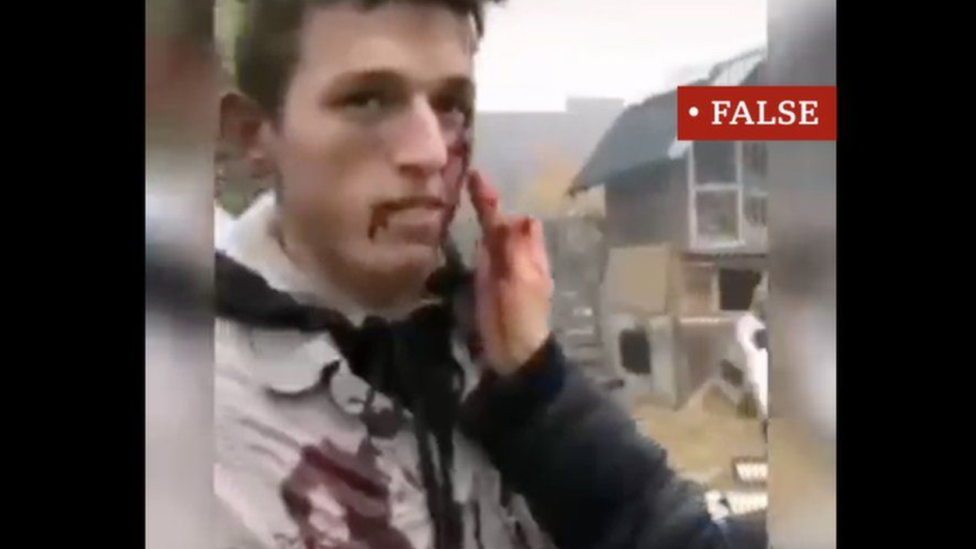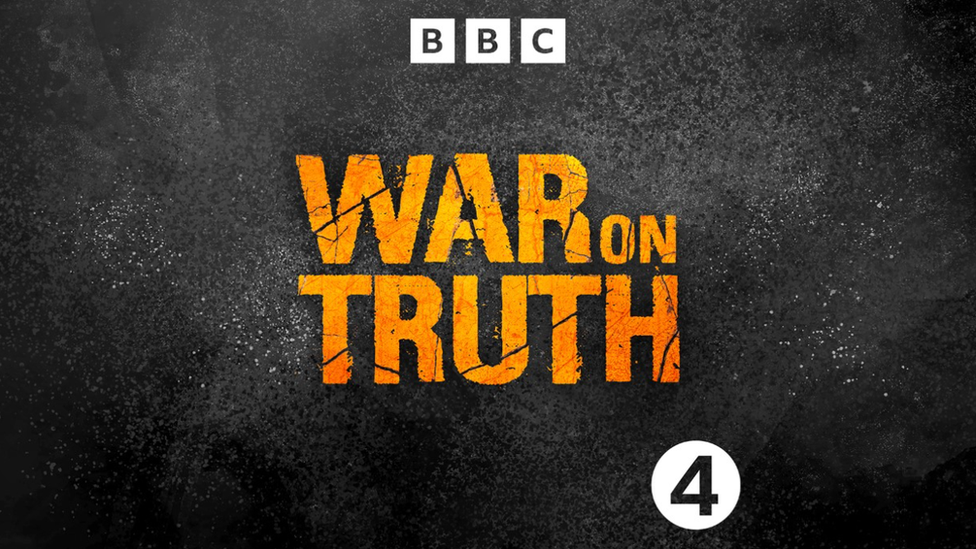How to spot false posts from Ukraine
- Published

Videos of actors from a Ukrainian film shot in 2020 have gone viral on Facebook and TikTok - with people falsely claiming that attacks in the country are being 'staged'
Russia's invasion of Ukraine has triggered a wave of falsehoods on social media and the airwaves. In a new Radio 4 podcast series, War on Truth, our specialist reporter follows the stories of people caught up by misinformation - and gives some tips about how to avoid it.

Since the war began, my inbox has been flooded with messages from people telling me about misleading videos on their social media feeds and troll accounts promoting conspiracy theories.
And it's not just on social media - it's also state-sponsored propaganda pushing false claims on air and beyond.
In a new podcast series, I'll be reporting on the information battle being waged over Ukraine - and hearing from the ordinary people sucked into it.
How can you spot bad information - and stop its spread?
1. Watch out for old and misleading videos
There are very real, distressing videos being shared of what's happening on the ground in Ukraine. But there is also footage from old conflicts going viral. Often people share it because they're shocked - or even trying to help. But it's just adding to the chaos for those in the country.

This footage was portrayed as being from the conflict in Ukraine - but was actually shot in Syria
The best way to figure out if a video is real or not is to look for clues - like the weather, the road signs, the languages people are speaking.
Videos of Russia's invasion of Crimea and from the blast in Beirut in 2020 have been shared widely, pretending to be from the current conflict.
Using Google Maps, you can figure out if the video is really from where it claims to be. And by using reverse image searches - available from a number of websites - you can see if that same video or image has been shared online before. That's a tell tale sign that it's been recycled from a previous event.
2. Who is sharing it - and why?
It's important to examine who shared a post in the first place. Can you verify who they are - and are they a trusted source?
Those who have posted misleading videos are sometimes looking for likes and shares. It's a distressing time - and posts about what's happening in Ukraine are likely to catch on. Others are sharing false claims to push certain narratives - to boost their political agendas or to sow doubt and confusion.
Several young people in the country have told me about pro-Russia accounts which argue with Ukrainians, suggesting without any proof that the war is "staged" or Ukraine is bombing its own territory.
One man I interviewed explained to me that even pictures of his home near Kyiv totally destroyed by bombs couldn't convince these trolls. Many of them have few or no followers, have taken their profile image from other places online and use generic usernames. They also only started to post after the invasion began. It's hard to tell who ultimately is running these accounts.
Other accounts that have promoted false claims about the Covid pandemic have turned their attention to sharing false conspiracy theories about the war. The same false tropes - for instance that those injured by bombing are "actors" - have come up again and again, and have even been pushed by Russian diplomats.

War in Ukraine: More coverage

3. Pause before you share
A lot of what's on social media about the war is frightening. It triggers a reaction - and that means people sometimes share posts before checking if they're real. Disinformation spreads because it plays on our emotions and our biases.

Steven Seagal is not fighting in the war - this is fake tweet made to look like it was sent out by CNN
It's not just about negative emotions - sometimes hopeful stories can also go viral. While they may boost morale, they contribute to the chaos online and make it harder to figure out what's actually happening.
The information war is about more than social media. It's a battle fought by governments in both Ukraine and Russia, which are pushing out propaganda. Question why a particular source might be saying something - and whether it's backed up by evidence.

Listen to War on Truth, from BBC Radio 4, out now on BBC Sounds.